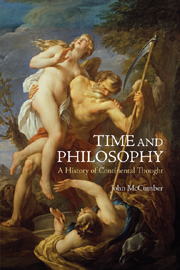Book contents
- Frontmatter
- Contents
- Acknowledgements
- Abbreviations and note on texts
- Introduction
- I Germany, 1790–1890
- 1 The collapse of Kant
- 2 Hegel discovers the past
- 3 Marx, capitalism and the future
- 4 Kierkegaard's dreadful future
- 5 Nietzsche and the boundless future
- II Germany and America, 1900–1968
- III France, 1945–2004
- IV Onwards, 2011–
- Further reading
- Bibliography
- Index
3 - Marx, capitalism and the future
from I - Germany, 1790–1890
- Frontmatter
- Contents
- Acknowledgements
- Abbreviations and note on texts
- Introduction
- I Germany, 1790–1890
- 1 The collapse of Kant
- 2 Hegel discovers the past
- 3 Marx, capitalism and the future
- 4 Kierkegaard's dreadful future
- 5 Nietzsche and the boundless future
- II Germany and America, 1900–1968
- III France, 1945–2004
- IV Onwards, 2011–
- Further reading
- Bibliography
- Index
Summary
In March 1843, eleven years after Hegel's death, authorities in the western German region of Westphalia closed down a newspaper called the Rheinische Zeitung, or the “Rhineland Gazette”. Among the people thrown out of work by this was the paper's twenty-five-year-old editor, Karl Marx. The newspaper itself was not very radical; its main audience was originally supposed to be businessmen, although after Marx became editor it veered left wards. That the authorities could not tolerate even something as mildly progressive as the Gazette so disenchanted its editor that he decided to move abroad. After marrying the following summer, Marx moved with his wife to Paris. This began a six-year migration, mostly forced, through Europe: in 1844 Karl and Jenny were expelled from France and moved to Brussels; a return to Germany in 1848 (to edit a revived version of the Gazette) did not work out; and in 1849 the couple arrived in London, where they lived for the rest of their lives. Marx died in 1883.
AFTER HEGEL: PHILOSOPHY IN CONFUSION
That Marx was working at a newspaper at all calls for some explanation. He came from a family of distinguished rabbis, but had a father who, like many German Jews in those days, had converted to Christianity mainly for career reasons. Karl himself obtained a doctorate in philosophy from Jena, the university where Hegel had failed to become a professor, and had hoped to succeed, where Hegel had failed for so long, in finding an academic position.
- Type
- Chapter
- Information
- Time and PhilosophyA History of Continental Thought, pp. 57 - 76Publisher: Acumen PublishingPrint publication year: 2011



